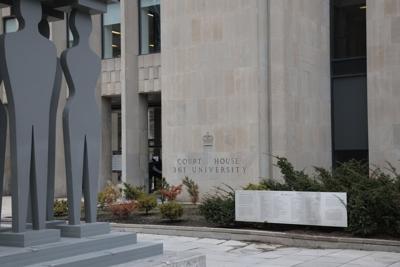Pointing to an increasingly heavy and complex caseload, Ontario‚Äôs chief justices are urging the federal government to hire more judges.Őż
‚ÄúSimply put: there are not enough judges to meet the demands of the cases in the system,‚ÄĚ said Superior Court Chief Justice Geoffrey Morawetz at the annual opening of the courts ceremony Thursday at Toronto‚Äôs criminal courthouse, where the province‚Äôs top judges provide an update on the state of affairs in their respective courts.Őż
The Superior Court handles all civil cases, some family matters, and the most serious criminal cases. Morawetz warned that the lack of judges is impeding his court‚Äôs goal of delivering timely justice.Őż
‚ÄúThe stakes are high,‚ÄĚ Morawetz said. ‚ÄúWithout timely justice, the health and well-being of families and children are in jeopardy. Without timely justice, criminal cases are at risk of being stayed ‚ÄĒ never having been heard on their merits. And without timely justice, Ontario‚Äôs economic stability in the area of civil justice is threatened.‚ÄĚ
He said his court‚Äôs judges ‚Äúface heavier caseloads, more plentiful evidence and far more self-represented litigants,‚ÄĚ all of which require more time.Őż
The call for more judicial resources was echoed by Chief Justice Michael Tulloch of the Ontario Court of Appeal, who said Thursday that his court‚Äôs complement of judges ‚ÄĒ a number allotted by the federal government ‚ÄĒ ‚Äúremains significantly under-resourced‚ÄĚ compared to other provinces.Őż
‚ÄúThe retirement of several of our judges, with more expected to follow, makes this challenge particularly pressing,‚ÄĚ he said.Őż
Tulloch highlighted that Ontario represents one-third of the country‚Äôs population and is Canada‚Äôs commercial hub, and that the province‚Äôs courts handle an ‚Äúextraordinary range of cases‚ÄĚ whose outcomes can have an impact beyond Ontario‚Äôs borders.Őż
‚ÄúEnsuring Ontario‚Äôs courts are properly resourced is thus not just a provincial concern ‚ÄĒ it is a national imperative,‚ÄĚ Tulloch said.
The public became especially familiar with the issue of the chronic lack of judges last year as a number of serious criminal cases ‚ÄĒ including charges of child sexual assault, gun possession, and human trafficking ‚ÄĒ to hear the cases within a timely manner.Őż
After years of criticism for its slow pace, the previous Trudeau government finally began appointing judges at a much faster pace during the former prime minister‚Äôs last year in office; so far, the government of Mark Carney has only appointed three judges in Ontario, all in London.Őż
Deputy federal justice minister Shalene Curtis-Micallef, representing Justice Minister Sean Fraser at Thursday’s ceremony, told the chief justices she had been taking notes during their speeches.Őż
“I have heard the pointed questions and comments from the bench, so I will take all of that back with me,” she said.Őż
The chief justices not only signaled a need to quickly fill vacancies created when judges retire or go part-time, but to add entirely new positions to the province’s complement of judges. It comes at a time when the Superior Court is looking at ways to fundamentally reform its civil justice system to make it more efficient.
‚ÄúAccess to justice requires a civil justice system that is effective, timely, relevant and responsive,‚ÄĚ Morawetz said. ‚ÄúCurrently, we do not have that, and our province‚Äôs economic interest and our country‚Äôs national interests, now, more than ever, requires a timely and accessible civil justice system. Access to timely civil justice is a cornerstone of a well-functioning market economy. The public demands change. We must ‚ÄĒ and we will ‚ÄĒ do better.‚ÄĚ
Ultimately, he said he would like to see the court able to provide a resolution to a dispute within two years of the case entering the system.Őż
‚ÄúAmbitious ‚ÄĒ yes,‚ÄĚ he said. ‚ÄúBut maintaining the status quo poses the greatest risk of all.‚ÄĚ



























To join the conversation set a first and last name in your user profile.
Sign in or register for free to join the Conversation